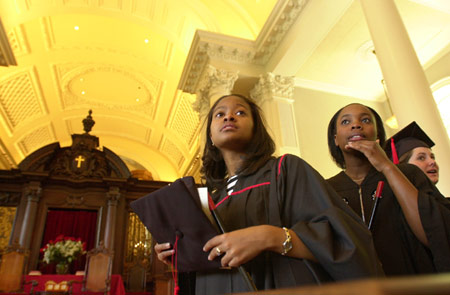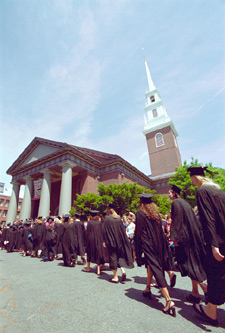In jest and in earnest, President Summers bids graduates ‘Godspeed and veritas’

At his first-ever Baccalaureate address, Harvard President Lawrence H. Summers encouraged the Class of 2002 to develop their unique talents, contribute to their communities, and devote the coming years to nurturing the friendships that will sustain them into the future.
“With your graduation, you move in a real sense from a time of taking and absorbing to a time of giving and contributing,” he said. “There are many ways you can contribute. One very important way is by offering your intelligent curiosity and capacity to question. Always ask.”
Like the high-spirited graduates, who jousted with their marshal’s batons while processing and snapped photos of their classmates before the service, Summers’ speech struck a balance between celebration and solemnity.
Commencement is a ritual of transition, Summers told the cap-and-gown clad degree candidates who packed the Memorial Church, but it marks transitions even more important than that from Harvard to the world beyond.
“With your graduation from Harvard, you make a transition from a period in life when choices seem to expand continually, to a point where, inevitably, options will close off, where there will be forks in the road and roads not taken,” he said.
While not always an easy concept to accept, Summers promised that by making choices with passion, there’s a possibility for satisfaction that the students may not yet have known.
“Those who pursue a passion, who build their own uniqueness, who are not one of the crowd, who are never fungible in what they are will stand for something special themselves,” he said.
He implored the students to seize the coming years of independence as a time to nurture relationships with friends, family and loved ones, offering a story from his own family as an example.
Just before his installation as Harvard’s president this past October, he said, he prepared to rehearse his installation speech when he discovered that his twin 11-year-old daughters had replaced his text with their own: “Harvard is good, Harvard is great. Let us go forth and educate.”
“The smile on their faces as I read their lines will be my most enduring memory of the last year,” he said.

Summers also brought levity to the occasion, which has been practiced at Harvard since the first Commencement in 1642 and traditionally serves as a link between the religious origins of American colleges and universities and their increasingly secular contemporary practice.
He satirized grade inflation, last year’s Massachusetts Hall sit-in, fundraising mailings from Harvard Alumni Association, and unreturned library books.
“You are the most impressive, the smartest, the best dressed, the nicest, the most honorable, the most extraordinary class to graduate during my tenure as president of Harvard University,” he said, winning an outburst of applause.
“I think he really did himself proud with this speech,” said John Bingaman ’02 who, like many of the seniors, was hearing Summers speak for the first time.
“I like that he recognized that there’s more to life than prestige, that a successful life involves relationships and faith … that those are the most important things,” said Ana-Maria Patino ’02.
The service, for which the degree candidates processed through Harvard Yard, doffing their mortarboards at the John Harvard statue before snaking into the Memorial Church, also offered prayers and well-wishes from a variety of religious traditions.
The Rev. Peter J. Gomes, Plummer Professor of Christian Morals and Pusey Minister in the Memorial Church, presided, and students read from the Hebrew Bible, Hindu scripture, the Holy Qur’an, and the New Testament in English and in the native language of the text.




